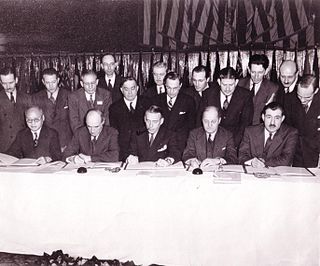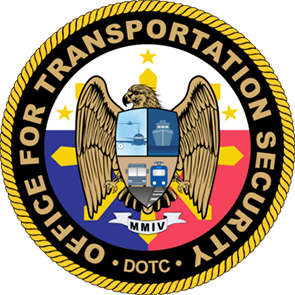
Aircraft hijacking is the unlawful seizure of an aircraft by an individual or a group. Dating from the earliest of hijackings, most cases involve the pilot being forced to fly according to the hijacker's demands. There have also been incidents where the hijackers have overpowered the flight crew, made unauthorized entry into the cockpit and flown them into buildings—most notably in the September 11 attacks—and in some cases, planes have been hijacked by the official pilot or co-pilot, such as with Ethiopian Airlines Flight 702.

The International Civil Aviation Organization is a specialized agency of the United Nations that coordinates the principles and techniques of international air navigation, and fosters the planning and development of international air transport to ensure safe and orderly growth. The ICAO headquarters are located in the Quartier international de Montréal of Montreal, Quebec, Canada.

Korean Air Lines Flight 007 (KE007/KAL007) was a scheduled Korean Air Lines flight from New York City to Seoul via Anchorage, Alaska. On September 1, 1983, the flight was shot down by a Soviet Sukhoi Su-15 interceptor aircraft. The Boeing 747 airliner was en route from Anchorage to Seoul, but owing to a navigational mistake made by the crew, the airliner drifted from its planned route and flew through Soviet prohibited airspace over underground silos with intercontinental ballistic missiles. The Soviet Air Forces treated the unidentified aircraft as an intruding U.S. spy plane, and destroyed it with air-to-air missiles, after firing warning shots. The South Korean airliner eventually crashed into the sea near Moneron Island west of Sakhalin in the Sea of Japan, killing all 246 passengers and 23 crew aboard, including Larry McDonald, a United States representative. It is the worst Korean Airlines disaster to date. The Soviet Union found the wreckage under the sea two weeks later on September 15 and found the flight recorders in October, but this information was kept secret by the Soviet authorities until 1992, after the country's dissolution.

The Convention on International Civil Aviation, also known as the Chicago Convention, established the International Civil Aviation Organization (ICAO), a specialized agency of the United Nations charged with coordinating international air travel. The Convention establishes rules of airspace, aircraft registration and safety, security, and sustainability, and details the rights of the signatories in relation to air travel. The convention also contains provisions pertaining to taxation.
Brothers to the Rescue is a Miami-based activist nonprofit organization headed by CIA agent José Basulto. Formed by Cuban exiles, the group is widely known for its opposition to the Cuban government and its former leader Fidel Castro. The group describes itself as a humanitarian organization aiming to assist and rescue raft refugees emigrating from Cuba and to "support the efforts of the Cuban people to free themselves from dictatorship through the use of active non-violence". Brothers to the Rescue, Inc., was founded in May 1991 "after several pilots were touched by the death of" fifteen-year-old Gregorio Perez Ricardo, who "fleeing Castro's Cuba on a raft, perished of severe dehydration in the hands of U.S. Coast Guard officers who were attempting to save his life."
The Paris Convention of 1919 was the first international convention to address the political difficulties and intricacies involved in international aerial navigation. The convention was concluded under the auspices of the International Commission for Air Navigation. It attempted to reduce the confusing patchwork of ideologies and regulations which differed by country by defining certain guiding principles and provisions, and was signed in Paris on 13 October 1919.
Aviation law is the branch of law that concerns flight, air travel, and associated legal and business concerns. Some of its area of concern overlaps that of admiralty law and, in many cases, aviation law is considered a matter of international law due to the nature of air travel. However, the business aspects of airlines and their regulation also fall under aviation law. In the international realm, the International Civil Aviation Organization (ICAO) provides general rules and mediates international concerns to an extent regarding aviation law. The ICAO is a specialized agency of the United Nations.
The Philippine National Police Aviation Security Group (PNP-AVSEGROUP) is responsible for enforcing laws and regulations related to air travel in the Philippines.

A forced landing is a landing by an aircraft made under factors outside the pilot's control, such as the failure of engines, systems, components, or weather which makes continued flight impossible. However, the term also means a landing that has been forced by interception.

War can heavily damage the environment, and warring countries often place operational requirements ahead of environmental concerns for the duration of the war. Some international law is designed to limit this environmental harm.
The following outline is provided as an overview of and topical guide to the United Nations:
Standards And Recommended Practices (SARPs) are technical specifications adopted by the Council of ICAO in accordance with Article 37 of the Convention on International Civil Aviation in order to achieve "the highest practicable degree of uniformity in regulations, standards, procedures and organization in relation to aircraft, personnel, airways and auxiliary services in all matters in which such uniformity will facilitate and improve air navigation".
The Directorate General of Civil Aviation (DGCA) is a statutory body of the Government of India to regulate civil aviation in India. It became a statutory body under the Aircraft (Amendment) Act, 2020. The DGCA investigates aviation accidents and incidents, maintains all regulations related to aviation and is responsible for issuance of licenses pertaining to aviation like PPL's, SPL's and CPL's in India. It is headquartered along Sri Aurobindo Marg, opposite Safdarjung Airport, in New Delhi. The Government of India is planning to replace the organisation with a Civil Aviation Authority (CAA), modelled on the lines of the American Federal Aviation Administration (FAA).
The Convention on Offences and Certain Other Acts Committed on Board Aircraft, commonly called the Tokyo Convention, is an international treaty concluded at Tokyo on 14 September 1963. It entered into force on 4 December 1969, and as of 2022 has been ratified by 187 parties.

In United Nations Security Council Resolution 666, adopted on September 13, 1990, after recalling resolutions 661 (1990) and 664 (1990) which discussed the humanitarian situation in Iraq and Kuwait and the detention of nationals from foreign countries, the Council decided to ask the 661 Committee to determine if humanitarian needs have arisen and to keep the situation under review. At the same time, it expected Iraq to comply with its obligations under international law, including the Fourth Geneva Convention, relating to the safety and detainment of third-state nationals in Iraq and occupied Kuwait.

United Nations Security Council resolution 670, adopted on 25 September 1990, after recalling resolutions 660 (1990), 661 (1990), 662 (1990), 664 (1990), 665 (1990), 666 (1990) and 667 (1990) on the topic of Iraq, the council condemned the continued Iraqi occupation of Kuwait, the violence against Kuwaiti citizens and its defiance of Security Council resolutions. It also noted the expulsion of Iraqi diplomats from several countries. As a consequence, the Council decided to impose further sanctions on Iraq, relating to civil aviation.

United Nations Security Council resolution 1221, adopted unanimously on 12 January 1999, after reaffirming Resolution 696 (1991) and all subsequent resolutions on Angola, particularly resolutions 1196 (1998) and 1219 (1998), the Council condemned the downing of two commercial planes over UNITA-controlled territory in Angola and demanded that UNITA leader Jonas Savimbi co-operate in the search for survivors of the recent plane crashes.

The Office for Transportation Security (OTS) is the single authority responsible for the security of the transportation systems of the Philippines, including civil aviation, sea transport and maritime infrastructure, land transportation, rail system and infrastructure.

On 24 February 1996 a Cuban Air Force Mikoyan MiG-29UB shot down two unarmed Cessna 337 Skymaster aircraft operated by Brothers to the Rescue, an organization opposed to the Cuban government. The Organisation of American States (OAS) reported that no warning was given; Cuban government sources said "These people knew what they were doing. They were warned", and that the aircraft had entered Cuban airspace. All the occupants of the aircraft were killed: Carlos Costa, Armando Alejandre, Jr., Mario de la Peña, and Pablo Morales. A third Cessna involved escaped. Previous similar flights had released propaganda leaflets over Cuba.

Ryanair Flight 4978 was a regularly scheduled international passenger flight from Athens International Airport, Greece, to Vilnius Airport, Lithuania, operated by Buzz, a Polish subsidiary of the Irish airline Ryanair. On 23 May 2021, while in Belarusian airspace, it was diverted by the Belarusian government to Minsk National Airport due to alleged claims of a Hamas bombing attempt, where two of its passengers, opposition activist and journalist Roman Protasevich and his girlfriend Sofia Sapega, were arrested by authorities. The aircraft was allowed to depart after seven hours, reaching Vilnius eight and a half hours behind schedule.












